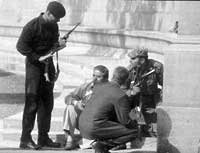 Family squabbles are the worst. More than disharmonious, they're also never-ending, and as time goes by, hostilities resume for ever more trivial or incomprehensible reasons. Any one whose clan is prone to disagreements knows what I mean. And when you look around a region like this one, where everyone is related in some way, shape or form, add danger and cynical disregard for reality to an already explosive mix.
Family squabbles are the worst. More than disharmonious, they're also never-ending, and as time goes by, hostilities resume for ever more trivial or incomprehensible reasons. Any one whose clan is prone to disagreements knows what I mean. And when you look around a region like this one, where everyone is related in some way, shape or form, add danger and cynical disregard for reality to an already explosive mix. At the moment, I'm talking about those two feuding cousins, India and Pakistan. Their latest flare-up is holding much to ransom. Regional peace of course, the Himalayan environment if they confine any future fighting to convention weapons, the wider South Asian skies and soil if they go nuclear, poverty alleviation across their vast pool of poor people, investment in their flagging economies for the middle and upper classes, tourism in every country, including Nepal, badly in need of planeloads of spendthrift sophisticates. The list is bleakly endless.
And why are they fighting-or refusing to make peace-this time? Well, as ever, talk to one party and you hear how the other is totally to blame, a demon, a pariah, untrustworthy and a dealer in death. It matters not which one-each thinks ill of the other. In India, a free media spins constant speculative tales of support for Islamic extremism across a dangerous border, some true, others fearfully fantastic. The fantasies, in part, are because Islamabad denies Indian journalists visas. In Pakistan, people hear a nightly tirade disguised as news on state-run media, a litany of rape, pillage and human rights abuses in Kashmir, all blamed on Indian security forces or the government. Steps to curb those problems aren't mentioned. You had only to watch the scenes on television last week from the Wagah border crossing, crowds baying for each others' blood, Punjab 53 years after bloody partition still divided by carefully maintained hatreds.
Not that the assault on the Indian parliament on the 13th of December wasn't an outrage. As an attack on democracy and openness, it was evil. But whoever is to blame, it is clearly part of the plan for groups like Al Qaeda-and yes, many of them are involved in fighting in Indian Kashmir, even based in Pakistan.
But don't they understand in Delhi that a war pitting a largely Hindu country against a Muslim state is exactly what the bad guys want? Equally, doesn't General Musharraf understand that the days of supporting cross border militant groups in Kashmir are over? That any organisation advocating violence against India can no longer be based on Pakistani soil. It has to stop, and not just because Washington or London is worried about nuclear war. No one-including nasty nihilists like bin Laden and his ilk-should be allowed to think that violence works. Full stop.
But for that to be so, we all have to behave less emotionally, with more of an eye to the future and the fate of our children. Just because the Americans have chosen to use brute military force against the Al Qaeda doesn't mean that is the answer to everything. Indeed, many of us urged Washington to avoid easy options like bombing Afghanistan to dislodge the Taleban, precisely because of the can of multi-hued worms that now gapes open.
India-with full justification-sees itself deeply violated by an act of terror, the attack on Parliament. It endured similar acts in the past, and even a territorial invasion by Pakistani forces around Kargil in 1999, and did not threaten the region with war. Now, with Afghanistan still under US bombardment and crucial state elections in Uttar Pradesh in February, even a wise old moderate like Atal Behari Vajpayee can barely resist hardline and populist pressure to beat the war drums as loudly as possible.
I believe that those elections are what's pushing the current situation past critical mass. I also think Mr Vajapayee does not want war. Nor does General Musharraf. It's wrong, but the rest of us have no voice in a conflict that will engulf us all, poison our children and set this region back a hundred years or more. The two leaders are the key to this crisis. I hope they know just what is at stake, and what their places in history will reveal, whatever they do.
I plead with them on behalf of the overwhelmingly young population of South Asia, the people who crave peace and prosperity, not radiation sickness and annihilation. Step back from the brink, find common ground, win the Nobel Peace Prize. Or go down in history as men of war.



